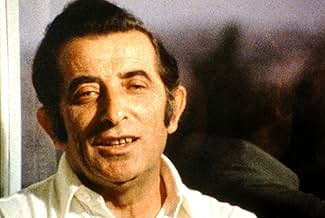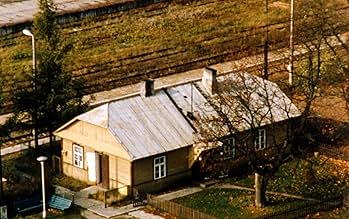Sobibór, 14 octobre 1943, 16 heures
- 2001
- Tous publics
- 1h 35m
IMDb RATING
7.4/10
635
YOUR RATING
A gripping account of the prisoners uprising at the Nazi extermination camp of Sobibor in 1943.A gripping account of the prisoners uprising at the Nazi extermination camp of Sobibor in 1943.A gripping account of the prisoners uprising at the Nazi extermination camp of Sobibor in 1943.
- Director
- Writer
- Stars
- Awards
- 1 win & 2 nominations total
- Director
- Writer
- All cast & crew
- Production, box office & more at IMDbPro
Featured reviews
I am afraid it take a lot more to make a movie, than passing an hour interview with a fixed close up, plus two excruciatingly boring introduction and conclusion. Also the account contains details which are difficult to believe, mainly that the protagonist managed to escape 7 times and was caught 7 times and never killed.
With all my respect to the protagonist and admiration for him, the documentary could hardly be technically poorer. I would rather suggest the movie "Escape from Sobibor", which is really accurate in details, or the excellent and breathtaking book "From The Ashes of Sobibor" by Thomas Blatt, another participant to the Sobibor insurrection.
With all my respect to the protagonist and admiration for him, the documentary could hardly be technically poorer. I would rather suggest the movie "Escape from Sobibor", which is really accurate in details, or the excellent and breathtaking book "From The Ashes of Sobibor" by Thomas Blatt, another participant to the Sobibor insurrection.
10guiguil
It is a fixed shot of Yehuda Lerner telling how he succeeded to escape from the Extermination camp of Sobibor. The sober way of this documentary keep the emotion of that simple man heroic action. The first time I saw this documentary I was dazzled by the modesty of Yehuda Lerner in regard to his heroic action. He says anyway he was already dead so why not trying to escape (he escaped many times from concentration camp before the extermination camp of Sobibor) and that he had a good star.
Besides this great lesson of fighting of life of this kid (he was only 16), we learn how was managed an extermination camp and we have a lot of details that give us an idea how it was. We understand too how difficult it was for jewish population and others extermined people to fight against Nazi. People could not believe they were getting extermined and they didn't know they had to organised themselves against that and moreover it is difficult to fight when you are not a soldier or a political militant. You can see that in the beautiful movie Roman Polanski's The Pianist.
It is a must see movie because it is about the only (or one of the only) succeeded escaped from extermination camp.
Besides this great lesson of fighting of life of this kid (he was only 16), we learn how was managed an extermination camp and we have a lot of details that give us an idea how it was. We understand too how difficult it was for jewish population and others extermined people to fight against Nazi. People could not believe they were getting extermined and they didn't know they had to organised themselves against that and moreover it is difficult to fight when you are not a soldier or a political militant. You can see that in the beautiful movie Roman Polanski's The Pianist.
It is a must see movie because it is about the only (or one of the only) succeeded escaped from extermination camp.
I understand how important it is to tell this story, but nothing can make up for how boring the execution of this film is. At one point its a 45 min. head shot of the main character who is telling the story. The man constantly restates himself to the point where you the audience member find yourself wishing for a bullet in the head to stop the agony. You would think that with the large amount of film that was shot by the German army during the Third ritch that director Claude Lanzmann could have made this film more visually appealing and interesting than the boring monologue that we are left with.
From the director of "Shoah," Claude Lanzmann, comes a documentary on the only successful revolt by Jewish concentration camp inmates. The Sobibor uprising in 1943 in Poland was investigated by Mr. Lanzmann many years ago when he was filming "Shoah" and his interviews with a participant named Lerner date from then. The director felt that the Sobibor uprising, which led to the closure of the extermination camp by the Nazis after many escaped, was too important to be a small part of his epic documentary. Now he has returned to this little known story.
Although Mr. Lerner is alive and well in Israel, Mr. Lanzmann felt that the much earlier footage of his extensive interview with the heroic survivor was all he needed and, in fact, much of the film is the interview itself.
At Sobibor, where Jews were usually gassed almost immediately upon arrival, a small number were selected for slave labor. Knowing that they were doomed and led by an experienced soldier, a Jewish captain of the Red Army, a handful of inmates resolved to kill the few Germans in command of the large and brutal Ukrainian contingent that actually did most of the dirty work.
Despite the horror of the situation and Mr. Lerner's subdued but dramatic recitation of his many escapes from German hands before landing in Sobibor, both he and the audience can not resist a smile when he repeatedly emphasizes that the escape plot could never have succeeded but for the Germans' compulsive, indeed fanatical, penchant for punctuality. That was the key to quickly killing them before any discovered what was coming down. Each was lured to a different camp shop with their "appointments" spaced only a few minutes apart.
The drama in this documentary is almost wholly in the interview, on-site scenes having a largely marginal quality. The film ends with a long recitation, presumably by the director, of the dates, places of origin and numbers of each of the transports to Sobibor. Chilling - and this infamous monument to madness was only one extermination camp.
Although Mr. Lerner is alive and well in Israel, Mr. Lanzmann felt that the much earlier footage of his extensive interview with the heroic survivor was all he needed and, in fact, much of the film is the interview itself.
At Sobibor, where Jews were usually gassed almost immediately upon arrival, a small number were selected for slave labor. Knowing that they were doomed and led by an experienced soldier, a Jewish captain of the Red Army, a handful of inmates resolved to kill the few Germans in command of the large and brutal Ukrainian contingent that actually did most of the dirty work.
Despite the horror of the situation and Mr. Lerner's subdued but dramatic recitation of his many escapes from German hands before landing in Sobibor, both he and the audience can not resist a smile when he repeatedly emphasizes that the escape plot could never have succeeded but for the Germans' compulsive, indeed fanatical, penchant for punctuality. That was the key to quickly killing them before any discovered what was coming down. Each was lured to a different camp shop with their "appointments" spaced only a few minutes apart.
The drama in this documentary is almost wholly in the interview, on-site scenes having a largely marginal quality. The film ends with a long recitation, presumably by the director, of the dates, places of origin and numbers of each of the transports to Sobibor. Chilling - and this infamous monument to madness was only one extermination camp.
I think that Lanzmann spoiled a good story: too much text at the beginning of the movie, an endless introduction, a mutilated translation from Yiddish to French... I don't know Yiddish, but you can easily guess that's impossible for the translator to summarize in a sentence two minutes of talk. So what did, in fact, Lerner say, always smiling, even when he was telling horrible things?
Lerner's testimony is not convincing either, at least for me. Something in the way he stands in front of the camera makes me wonder if he is telling all the truth. I disagree with the person that spoke about his "modesty": on the contrary I think he is anxious to portray himself as a hero.
I felt relieved when the movie finished and naturally I couldn't endure the long, long list of trains that Mr. Lanzmann delightedly recited for five minutes, I guess. A true disappointment.
Lerner's testimony is not convincing either, at least for me. Something in the way he stands in front of the camera makes me wonder if he is telling all the truth. I disagree with the person that spoke about his "modesty": on the contrary I think he is anxious to portray himself as a hero.
I felt relieved when the movie finished and naturally I couldn't endure the long, long list of trains that Mr. Lanzmann delightedly recited for five minutes, I guess. A true disappointment.
Did you know
- TriviaChosen by "Les Cahiers du cinéma" (France) as one of the 10 best pictures of 2001 (#08)
- Quotes
Yehuda Lerner: It was a simple fact: If we didn't act, we'd be killed like all the Jews before us. So it was this reality that forced us to act like this.
- ConnectionsVersion of Les rescapés de Sobibor (1987)
Details
- Release date
- Country of origin
- Languages
- Also known as
- Sobibór, October 14, 1943, 4 p.m.
- Filming locations
- Sobibór, Lubelskie, Poland(village near Sobibór Extermination Camp)
- Production companies
- See more company credits at IMDbPro
Box office
- Gross US & Canada
- $41,040
- Opening weekend US & Canada
- $7,412
- Oct 14, 2001
- Gross worldwide
- $79,728
Contribute to this page
Suggest an edit or add missing content

Top Gap
By what name was Sobibór, 14 octobre 1943, 16 heures (2001) officially released in India in English?
Answer




















